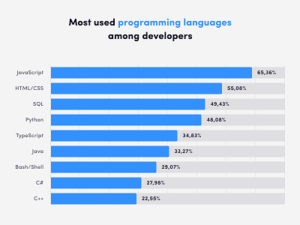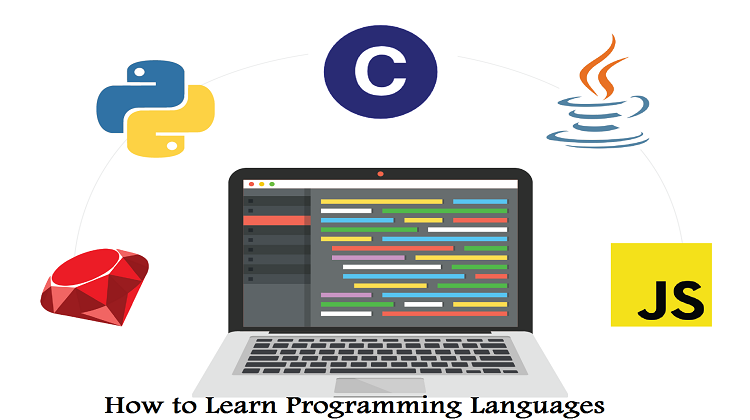Are you considering a career in web development, but you’re not sure which programming languages to learn? The confusion is understandable—there are a lot of languages to choose from. But which languages you need to know will depend on what specialty you choose: front end web development, back end web development, or full stack web development. Let’s take a deeper look at each one of these areas plus the languages required by each specialty.Learning a programming language can be a challenging but rewarding experience.
Here are some steps you can follow to learn a programming language:
- Choose a language: First, decide which programming language you want to learn. There are many programming languages available, each with its own strengths and weaknesses. Some popular programming languages are Python, Java, C++, JavaScript, and Ruby.
- Find resources: Once you have chosen a language, find resources to learn from. There are many resources available online, such as tutorials, documentation, and online courses. Some popular websites for learning programming are Codecademy, Udemy, and Coursera.
- Start with the basics: Start with the basics of the language. Learn the syntax, data types, control structures, and functions. These are the building blocks of the language, and understanding them is essential.
- Practice: Practice programming as much as you can. Start with simple programs and gradually increase the complexity. Write code, run it, and debug it. Experiment with different features of the language.
- Build projects: Build projects to apply what you have learned. This will help you to understand how the language works in the real world. Start with small projects and gradually increase the complexity.
- Learn from others: Join online forums, groups, or communities related to the language you are learning. Discuss programming concepts and ask for help when you need it. This will help you to learn from others and improve your skills.
- Stay up-to-date: Programming languages are constantly evolving, so it’s important to stay up-to-date with the latest developments. Read blogs, follow industry experts on social media, and attend conferences and meetups to stay informed.
Remember that learning a programming language takes time and practice. Don’t be discouraged if you don’t understand everything at first. Keep practicing, and eventually, you will become proficient in the language.
2. The Most Popular Coding Languages

the most popular programming languages according to various surveys and indices are:
- JavaScript: JavaScript is a client-side scripting language used primarily for creating interactive web pages and web applications.
- Python: Python is a high-level programming language that is popular for its simplicity and readability. It is used for web development, machine learning, data analysis, and scientific computing.
- Java: Java is an object-oriented programming language that is used for building desktop, web, and mobile applications. It is also used for developing enterprise-level software.
- C#: C# is a modern, object-oriented programming language that is used for developing Windows desktop applications, web applications, and video games.
- PHP: PHP is a server-side scripting language that is used for developing dynamic web pages and web applications.
- C++: C++ is a high-performance, general-purpose programming language that is used for developing operating systems, video games, and other high-performance applications.
- Ruby: Ruby is a dynamic, open-source programming language that is used for web development, scripting, and software development.
- Swift: Swift is a powerful, open-source programming language developed by Apple that is used for developing iOS and macOS applications.
- Kotlin: Kotlin is a modern, open-source programming language that is used for developing Android applications and web applications.
- Go: Go is an open-source programming language developed by Google that is used for building scalable, high-performance applications.
It’s worth noting that the popularity of programming languages can fluctuate over time based on trends in the industry and the emergence of new technologies.
3. What Languages Should a New Web Developer Learn?

If you’re a new web developer, there are a few programming languages that you should learn to get started:
- HTML: HTML (Hypertext Markup Language) is the foundation of web development. It is used to create the structure of a web page, including headings, paragraphs, images, and links.
- CSS: CSS (Cascading Style Sheets) is used to style the HTML elements on a web page, including colors, fonts, layouts, and animations.
- JavaScript: JavaScript is a client-side scripting language that is used to add interactivity to a web page, such as dynamic effects, form validation, and user interface enhancements.
- PHP: PHP (Hypertext Preprocessor) is a server-side scripting language that is used to create dynamic web pages and web applications. It can be used to interact with databases, process form data, and generate dynamic content.
- SQL: SQL (Structured Query Language) is used to interact with databases, including creating, modifying, and querying data. It is essential for web applications that require database interaction.
- jQuery: jQuery is a JavaScript library that simplifies the process of working with the Document Object Model (DOM) in web development. It provides a set of easy-to-use functions for manipulating HTML elements, handling events, and making AJAX calls.
- React: React is a JavaScript library for building user interfaces. It allows developers to create reusable UI components that can be used across multiple web pages and applications.
- Node.js: Node.js is a JavaScript runtime environment that allows developers to run JavaScript on the server-side. It can be used to create server-side web applications, APIs, and real-time applications.
Learning these programming languages will provide a strong foundation for web development. As you gain more experience, you can explore other languages and frameworks that are relevant to your specific interests and goals.

